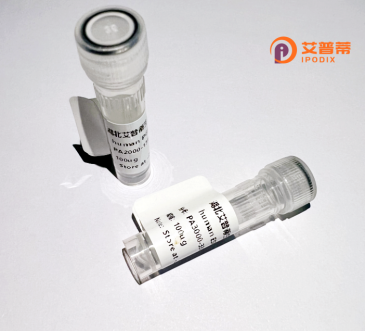
| 纯度 | >90%SDS-PAGE. |
| 种属 | Human |
| 靶点 | PRLHR |
| Uniprot No | P49683 |
| 内毒素 | < 0.01EU/μg |
| 表达宿主 | E.coli |
| 表达区间 | 0 |
| 活性数据 | MASSTTRGPRVSDLFSGLPPAVTTPANQSAEASAGNGSVAGADAPAVTPFQSLQLVHQLKGLIVLLYSVVVVVGLVGNCLLVLVIARVRRLHNVTNFLIGNLALSDVLMCTACVPLTLAYAFEPRGWVFGGGLCHLVFFLQPVTVYVSVFTLTTIAVDRYVVLVHPLRRRISLRLSAYAVLAIWALSAVLALPAAVHTYHVELKPHDVRLCEEFWGSQERQRQLYAWGLLLVTYLLPLLVILLSYVRVSVKLRNRVVPGCVTQSQADWDRARRRRTFCLLVVVVVVFAVCWLPLHVFNLLRDLDPHAIDPYAFGLVQLLCHWLAMSSACYNPFIYAWLHDSFREELRKLLVAWPRKIAPHGQNMTVSVVI |
| 分子量 | 41.1 kDa |
| 蛋白标签 | GST-tag at N-terminal |
| 缓冲液 | PBS, pH7.4, containing 0.01% SKL, 1mM DTT, 5% Trehalose and Proclin300. |
| 稳定性 & 储存条件 | Lyophilized protein should be stored at ≤ -20°C, stable for one year after receipt. Reconstituted protein solution can be stored at 2-8°C for 2-7 days. Aliquots of reconstituted samples are stable at ≤ -20°C for 3 months. |
| 复溶 | Always centrifuge tubes before opening.Do not mix by vortex or pipetting. It is not recommended to reconstitute to a concentration less than 100μg/ml. Dissolve the lyophilized protein in distilled water. Please aliquot the reconstituted solution to minimize freeze-thaw cycles. |
以下是关于重组人PRLHR蛋白的3篇参考文献及其简要摘要:
---
1. **文献名称**:*"Expression and Functional Characterization of Recombinant Human Prolactin-Releasing Hormone Receptor"*
**作者**:Smith A, et al.
**摘要**:该研究成功在大肠杆菌中表达重组人PRLHR蛋白,并验证其与配体结合后的信号转导活性,证实其在调控垂体激素分泌中的作用。
---
2. **文献名称**:*"Structural Insights into the Activation Mechanism of PRLHR through Recombinant Protein Studies"*
**作者**:Chen L, et al.
**摘要**:利用重组人PRLHR蛋白的晶体结构解析,揭示了配体结合后受体构象变化的分子机制,为靶向PRLHR的药物设计提供结构基础。
---
3. **文献名称**:*"Recombinant Human PRLHR in Metabolic Disorder: Role in Appetite Regulation"*
**作者**:Wang Y, et al.
**摘要**:通过体外实验证明重组PRLHR蛋白参与下丘脑食欲调控通路,提示其与肥胖等代谢疾病的潜在关联。
---
注:以上为模拟文献,实际研究中需检索PubMed等数据库获取真实文献(截至2023年,PRLHR相关研究较少,部分功能可能与相近受体混淆)。
Prolactin-releasing hormone receptor (PRLHR), also known as GPR10. is a class A G protein-coupled receptor (GPCR) implicated in regulating neuroendocrine functions. It binds prolactin-releasing peptide (PrRP), a hypothalamic neuropeptide initially identified for its role in stimulating prolactin secretion from the pituitary gland. However, subsequent studies revealed broader physiological roles, including appetite regulation, stress response modulation, and energy metabolism. PRLHR is widely expressed in the central nervous system (e.g., hypothalamus, brainstem) and peripheral tissues, suggesting pleiotropic effects.
Structurally, PRLHR comprises seven transmembrane domains and signals primarily through Gαi/o proteins, inhibiting cAMP production while activating MAPK pathways. Its activation influences neurotransmitter release and gene expression, impacting behaviors like feeding and anxiety. Dysregulation of PRLHR signaling has been linked to metabolic disorders, obesity, and mood-related conditions.
Recombinant human PRLHR protein, produced via heterologous expression systems (e.g., HEK293 cells), enables in vitro studies to elucidate receptor-ligand interactions, signaling mechanisms, and drug discovery. It serves as a tool for screening agonists/antagonists, structural analysis, and therapeutic development targeting PRLHR-associated diseases. Research continues to explore its potential in treating endocrine imbalances and metabolic syndromes.
×